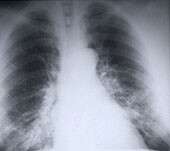A high vascular endothelial growth factor signaling score correlates with good prognosis in patients with early squamous cell carcinoma of the lung, according to a study published online Feb. 21 in the Journal of Clinical Oncology.
(HealthDay) -- A high vascular endothelial growth factor (VEGF) signaling score correlates with good prognosis in patients with early squamous cell carcinoma (SCC) of the lung, according to a study published online Feb. 21 in the Journal of Clinical Oncology.
María J. Pajares, from the University of Navarra in Pamplona, Spain, and colleagues used automatic immunostaining to assess tumor cell expression of VEGF, VEGF receptor (VEGFR) 1, and VEGFR2 in 298 patients with early-stage nonsmall-cell lung cancer (NSCLC), recruited as part of the multicenter European Early Lung Cancer Detection Group project. By adding the tumor cell expression value of VEGF and its two receptors, they calculated a score measuring the VEGF signaling pathway. The results were validated in two independent NSCLC cohorts.
The researchers found that, in early SCC, the combination of high VEGF, VEGFR1, and VEGFR2 protein expression correlated with significantly reduced risk of disease progression (multivariate analysis hazard ratio, 0.62; P = 0.02). These results were validated, confirming the favorable prognostic value of high VEGF signaling score in early lung SCC.
"Our results clearly indicate that the combination of high expression of the three key elements in the VEGF pathway is associated with a good prognosis in patients with early SCC but not in patients with adenocarcinoma," the authors write.
More information:
Abstract
Full Text (subscription or payment may be required)
Journal information: Journal of Clinical Oncology
Copyright © 2012 HealthDay. All rights reserved.


















